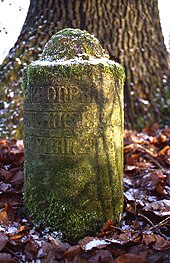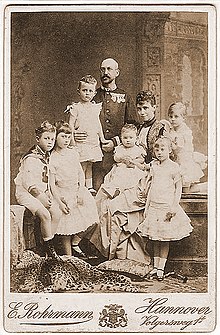Ernst August of Hanover (1845–1923)

Ernst August (II.) Of Hanover (born September 21, 1845 in Hanover ; † November 14, 1923 in Gmunden , Austria ) was the last Crown Prince of the Kingdom of Hanover . He also held the titles of Prince of Great Britain and Ireland , Prince of Hanover , Duke of Braunschweig-Lüneburg , 3rd Duke of Cumberland and Teviotdale and 3rd Earl of Armagh .
Life
Childhood and youth

Ernst August Wilhelm Adolph Georg Friedrich was the only son of the blind King George V of Hanover (1819–1878) and Princess Marie of Saxony-Altenburg (1818–1907). He was born during the reign of his grandfather King Ernst August I of Hanover in the Fürstenhof in Hanover, the former residence of the Crown Prince, and became Crown Prince in November 1851 after his death and his father's accession to the throne. After the annexation of the Kingdom of Hanover by Prussian troops in 1866 and the dethroning of his father, he followed him into exile in Austria. The Crown Prince Guard was set up for him.
Exile in Austria
Emperor Franz Joseph I appointed him Austrian colonel, but the prince did not do any active service. In the spring of 1868, the Hanover royal family and the Austrian imperial court came from Vienna to take a cure in the Salzkammergut . She stayed in the Villa Redtenbacher near Gmunden , where Crown Prince Ernst August later settled permanently. In Grünau im Almtal he also owned extensive estates.
In Gmunden on June 15, 1882, construction began on Cumberland Castle , which was built as a residence in exile in the neo-Gothic Tudor style . The architect Ferdinand Schorbach from Hanover was commissioned with the planning. On September 15, 1886, they moved into the newly built castle, which he and his family lived in continuously until Ernst August's death in 1923.
Heir to the throne
When King George V died in Paris on June 12, 1878, Crown Prince Ernst August succeeded him as Duke of Cumberland and Teviotdale , and Queen Victoria appointed him Knight Companion of the Order of the Garter (August 1, 1878).
Although Prince of Great Britain and Ireland, General of the British Army and Austrian officer, Ernst August always viewed himself as an exiled German monarch. Even after his father's death, he did not seize the opportunity to be reconciled with Prussia. Rather, in a letter addressed to the powers and courts, dated Gmunden July 11, 1878, he preserved all his rights to the Kingdom of Hanover and declared, until the realization of the same, the title of Duke of Cumberland and Teviotdale and Duke of Braunschweig and Lüneburg with the Wanting to use the title “ Royal Highness ”. As a result, he was refused the return of the Guelph Fund by Prussia.
Marriage and offspring
On December 22nd, 1878, Ernst August married Princess Thyra of Denmark , the youngest daughter of King Christian IX , in Copenhagen . of Denmark and sister of the future Danish King Frederick VIII , the future British Queen Alexandra , the Russian Tsarina Maria Fjodorovna and the King of Greece, George I. The marriage had six children:
- Marie Luise (1879–1948) ⚭ 1900 Prince Max von Baden , last Chancellor of the German Empire
- Georg Wilhelm (1880–1912), died in a car accident in the forest near Nackel in Brandenburg
- Alexandra (1882–1963) ⚭ 1904 Grand Duke Friedrich Franz IV of Mecklenburg-Schwerin
- Olga (1884-1958)
- Christian (1885–1901)
- Ernst August (1887–1953), ruling Duke of Braunschweig
- ⚭ 1913 Princess Viktoria Luise of Prussia , only daughter of Kaiser Wilhelm II.
Duchy of Brunswick
When Ernst August's distant cousin, Duke Wilhelm von Braunschweig-Wolfenbüttel , died on October 18, 1884 without a direct heir, Ernst August, as head of the Welfenhaus, registered his claims to the Duchy of Braunschweig .
He declared that he wanted to govern the country according to the German constitution. Since he did not renounce his claims to the Kingdom of Hanover, but had declared in a letter to Queen Victoria as early as 1878 that his recognition of the imperial constitution in no way meant the abandonment of his Hanoverian inheritance claims, the German Federal Council, on application and after massive pressure from Prussia, gave on 2 July 1885 announced that the government of the Duke of Cumberland and Teviotdale in Braunschweig was not compatible with the basic principles of the federal treaties and the imperial constitution.
In the Duchy of Braunschweig itself, the governing council of Regency, headed by State Minister Hermann Graf von Görtz-Wrisberg, decided in favor of a pragmatic policy and the solution of proposing the reign of Prussian Prince Albrecht , which he accepted.
Relaxation with the Hohenzollern

Ernst August's policy with the Hohenzollerns only relaxed shortly before the beginning of the First World War . On May 24, 1913, his youngest son Ernst August (III.) Married the only daughter of Kaiser Wilhelm II , Viktoria Luise . In October 1913 he waived his claims to the Duchy of Braunschweig in favor of his son , who thus became the ruling Duke of Braunschweig on November 1, 1913, but lost his duchy - like all German princes - as a result of the First World War in November 1918. Wilhelm II appointed Ernst August (the Elder) a Knight of the Order of the Black Eagle .
Break with Great Britain
The First World War led to a break between the British royal family and their Hanoverian cousins. Since Ernst August was on the German-Austrian side and therefore “carried arms against England”, he was expelled from the Order of the Garter and from the British Army. In addition, he was stripped of his British nobility titles and rights by order of King George V of Great Britain and Ireland on March 28, 1919, whereby the Titles Deprivation Act of 1917 formed the legal basis. Besides Ernst August as Duke of Cumberland and Teviotdale , Earl of Armagh and Prince of Great Britain and Ireland , three other persons were affected by this law: Duke Carl Eduard von Sachsen-Coburg and Gotha as Duke of Albany, Earl of Clarence, Baron Arklow and Prince of Great Britain and Ireland , also Duke Ernst August (III.) of Braunschweig-Lüneburg as Prince of Great Britain and Ireland and Heinrich Graf von Taaffe as 12th Viscount Taaffe of Corren and Baron of Ballymote . Under the Titles Deprivation Act, the male heirs of these persons have the right to ask the British Crown to restore them to these titles, but have not yet made use of them.
Old age and death

The former Crown Prince of Hanover and former Duke of Cumberland and Teviotdale spent his twilight years in the Cumberland Castle in Gmunden in Upper Austria, which he built, where he died on November 14, 1923. He was buried in the mausoleum of Cumberland Castle in Gmunden.
In 1894, Cumberlandstrasse in Vienna-Penzing (14th district) was named after him.
literature
- Ingrid Spitzbart: King George V of Hanover and his family in Gmunden exile. In: Gudrun Keindorf, Thomas Moritz (ed. On behalf of the association "Friends of Burg Plesse" eV): "Bigger even than Heinrich the Lion." King Georg V of Hanover as the builder and identity giver. Accompanying volume for the exhibition. State and University Library Göttingen, Paulinerkirche. Mecke Verlag, Duderstadt 2003, ISBN 3-936617-16-3 , pp. 67-80
Web links
- Ernst August von Cumberland in Baden near Vienna : Local news. In Weilburg Castle. In: Badener Bezirks-Blatt , July 4, 1882, p. 2 (online at ANNO ).
Individual evidence
| predecessor | Office | successor |
|---|---|---|
| George V. |
Head of the House of Hanover 1878–1923 |
Ernst August III. |
| George V. |
Duke of Cumberland and Teviotdale 1878-1919 |
Revoked title |
| personal data | |
|---|---|
| SURNAME | Ernst August of Hanover |
| ALTERNATIVE NAMES | Ernst August of Hanover, 3rd Duke of Cumberland and Teviotdale; Ernst August II of Hanover |
| BRIEF DESCRIPTION | Prince of Great Britain and Ireland, Prince of Hanover |
| DATE OF BIRTH | September 21, 1845 |
| PLACE OF BIRTH | Hanover |
| DATE OF DEATH | November 14, 1923 |
| Place of death | Gmunden , Austria |


